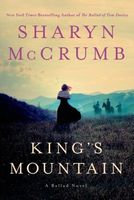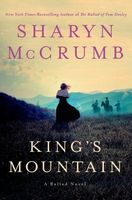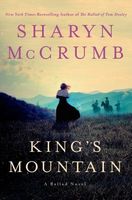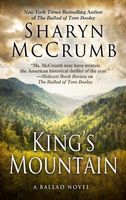- Series
- | Authors
- | Book Release Calendar
- | Search |
- Genres
- | Newsletter
- Welcome to FictionDB, Guest
- | My Account
- | Help

King's Mountain — Sharyn McCrumb
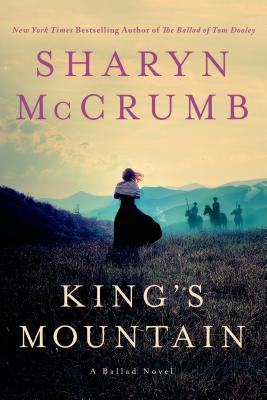
-
Published:
Sep-2013 (Hardcover)
Sep-2014 (Paperback) -
Formats:
Print / eBook / Audio -
Series:
-
Main Genre:
Historical -
Pages:
336 -
Rating:
-
Purchase:
-
Share:
John Sevier had not taken much interest in the American Revolution. Homesteading in the Carolina mountains, Sevier was too busy fighting Indians and taming the wilderness to worry much about a far-off war, but when an arrogant British officer sends a message over the mountains, threatening to burn the settlers' farms and kill their families, the war becomes personal.
That abrasive officer is British Army Major Patrick Ferguson, who is both charmingly antagonistic and surprisingly endearing. The younger son of a Scottish earl, Ferguson suffers constant misfortunes, making his dedication and courage count for nothing. When he loses the use of his arm from an injury at Brandywine, his commander sends him south, away from the war -- which, in 1780, George Washington and the Continental Army are losing. Ordered to recruit wealthy Southern planters to the British cause, Ferguson courts disaster by provoking the frontiersmen, and suddenly the far-off war is a sword's length away. The British aristocrat on a fine white horse is the antihero to Sevier's American pioneer spirit. Two Tory washerwomen, Virginia Sal -- whose lucid voice lends humor and mysticism to the pages -- and Virginia Paul, a mysterious woman too well-acquainted with death, portray the human side of the king's army. With a regiment of British regulars and local Tory volunteers, Ferguson believes he's an indomitable force.
Threatened by the Loyalists with invasion and the loss of their land, Sevier knows that Ferguson has to be stopped. In response, Sevier and his loyal comrades -- many of whom would play key roles in later parts of American history -- raise an unpaid volunteer militia of more than a thousand men. Bringing their own guns, riding their own horses, and wearing just their civilian clothes, the Overmountain Men ally themselves with other states' militias and march toward Charlotte in search of Ferguson's marauding army.
On a hill straddling the North and South Carolina lines, in what Thomas Jefferson later called "the turning point of the American Revolution," the Overmountain Men triumph, proving that the British forces can be stopped. Their victory at King's Mountain inspired the colonies to fight on, ending the war one year later at Yorktown.
Peppered with lore and the authentic heart of the people in McCrumb's classic Ballads, this is an epic book that paints the brave action of Sevier and his comrades against a landscape of richly portrayed characters. Harrowing battle descriptions compete with provoking family histories, as McCrumb once again shares history and legend like no one else. Both a novel of war and family, crafted with heart and depth, King's Mountain celebrates one of Appalachia's finest hours.
That abrasive officer is British Army Major Patrick Ferguson, who is both charmingly antagonistic and surprisingly endearing. The younger son of a Scottish earl, Ferguson suffers constant misfortunes, making his dedication and courage count for nothing. When he loses the use of his arm from an injury at Brandywine, his commander sends him south, away from the war -- which, in 1780, George Washington and the Continental Army are losing. Ordered to recruit wealthy Southern planters to the British cause, Ferguson courts disaster by provoking the frontiersmen, and suddenly the far-off war is a sword's length away. The British aristocrat on a fine white horse is the antihero to Sevier's American pioneer spirit. Two Tory washerwomen, Virginia Sal -- whose lucid voice lends humor and mysticism to the pages -- and Virginia Paul, a mysterious woman too well-acquainted with death, portray the human side of the king's army. With a regiment of British regulars and local Tory volunteers, Ferguson believes he's an indomitable force.
Threatened by the Loyalists with invasion and the loss of their land, Sevier knows that Ferguson has to be stopped. In response, Sevier and his loyal comrades -- many of whom would play key roles in later parts of American history -- raise an unpaid volunteer militia of more than a thousand men. Bringing their own guns, riding their own horses, and wearing just their civilian clothes, the Overmountain Men ally themselves with other states' militias and march toward Charlotte in search of Ferguson's marauding army.
On a hill straddling the North and South Carolina lines, in what Thomas Jefferson later called "the turning point of the American Revolution," the Overmountain Men triumph, proving that the British forces can be stopped. Their victory at King's Mountain inspired the colonies to fight on, ending the war one year later at Yorktown.
Peppered with lore and the authentic heart of the people in McCrumb's classic Ballads, this is an epic book that paints the brave action of Sevier and his comrades against a landscape of richly portrayed characters. Harrowing battle descriptions compete with provoking family histories, as McCrumb once again shares history and legend like no one else. Both a novel of war and family, crafted with heart and depth, King's Mountain celebrates one of Appalachia's finest hours.
Genres
Sub-Genres
Click on any of the links above to see more books like this one.
